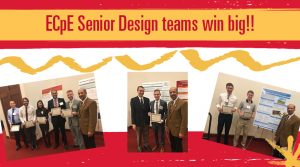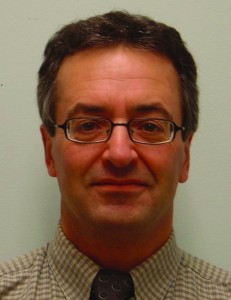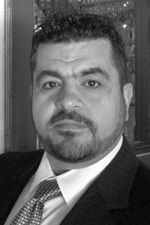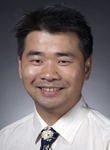1st Place: Micro-Electro-Mechanical Systems (MEMS) based Sensing System for Soil Conditions Monitoring
David Severson, Kyle Kehoe, Nathan Coonrod, Sok Yan Poon, Jacob Verheyen
Advisor: Shuo Yang & Dr. Yang Zhang
Currently, measuring changes and gathering data on soil moisture and temperature is not only expensive, but also occasionally unreliable. But this senior design team has formulated a device and plan to allow data-retrieval for soil moisture and temperature to be both affordable and trustworthy. The team has designed a sensor to observe the soil’s moisture levels and temperature throughout the course of a month. This sensor analyzes soil by measuring capacitance between the two plates on the PCB, and measures temperature by using a thermistor on the PCB, both read as a voltage.
2nd Place: High-Resolution ADC Using Delta-Sigma Architectures
Caroline Alva, Tyler Archer, Caleb Davidson, Mahmoud Gshash, Josh Rolles
Advisor: Randall Geiger
According to the team’s abstract, “Analog to digital converters (ADCs) are widely used to convert analog signals to the digital domain. There are dominantly two major classes of data converters. One is termed Nyquist Rate converters, and the other is termed Over-Sampled Data Converters or Delta-Sigma Data Converters. With Nyquist rate converters, samples of the input are converted to a Boolean signal when each sample is taken. In Over-sampled Data Converters, a large number of low resolutions are made with each sample, and the large number of low resolution outputs are then combined (decimated) into a higher-resolution output. Over-sampled data converters invariably have a low effective conversion rate but can achieve very high resolution. For example, over-sampled converters can readily achieve an effective resolution of 20-bits or more with a low sample rate and with relatively simple circuits. This project will involve the design of a slow-speed over-sampled data converter and the use of this data converter to provide a high-resolution digital output of an on-chip temperature sensor.”
3rd Place: 360 Web Cams for Zoos and Aquariums
Nathan Cool, Ian Jamieson, Zach Newton, TJ Yacoub, Alan Negrete, Sam Abdetlawab
Advisor: Henry Duwe
According to the team’s final report, “True 360 hopes to provide solutions to three major problems/needs. First, zoos and aquariums do not have access to an easy-to-use 360-degree webcam solution for their exhibits. No solution currently exists to act as a centralized (remote) connection and control hub for all of their webcams. Second, zoos and aquariums are always looking for ways to boost their social media presence and improve their marketing techniques. Finally, zookeepers, animal health professionals and other staff members are currently required to visit each exhibit on a regular basis in order to monitor the animals. This process is time-consuming, which means staff members have less time to focus on other important responsibilities.
By developing a system that allows zoo and aquarium staff members to connect to and remotely control multiple 360-degree webcams, the necessity of physically interacting with each webcam on a regular basis will be removed. The system will allow for webcams to be installed in both above-ground (indoor and outdoor) and underwater exhibits and controlled via a central web application. Conveniently, this application will help us solve the aforementioned marketing need and animal monitoring problem. With our system, zoos and aquariums will be able to constantly capture 360-degrees of animals, which can be extracted for use in educational live streams, promotional content, monitoring animal activity and even archival purposes.”
Honorable Mention: IoT Remote Monitoring Mobile App for Commercial Appliances
Hongyi Bian, John Fleiner, casey Gehling, Thomas Stackhouse, Ben Young, Yuanbo Zheng
Advisor: Goce Trajcevski
According to the team, “The purpose of our project is to find a method that mitigates scheduling conflicts between customers who want to access washing machines and dryers in a shared environment. To do so, our team will be utilizing the concept of IoT – Internet of Things. The internet of things consists of a network of physical hardware devices that can be controlled remotely.
Our proposed solution consists of two components: An IoT cloud service and a mobile application. An IoT cloud service will be used to register a set of washing machine and dryer control boards that can be controlled remotely. A multi-platform mobile application will be developed to connect to an IoT cloud service so that users may monitor, reserve, and control devices remotely. A reservation system on the mobile application will allow users to reserve a device for a set period of time. Once reserved, a time-stamped code will be generated for the user. During the reservation time, the reserved machine will be locked until the time-stamped code has been entered by the user, essentially gives users the opportunity to use a machine without it being taken. This will help prevent customers from traveling to a shared-appliance room only to find all of the machines in use.”




